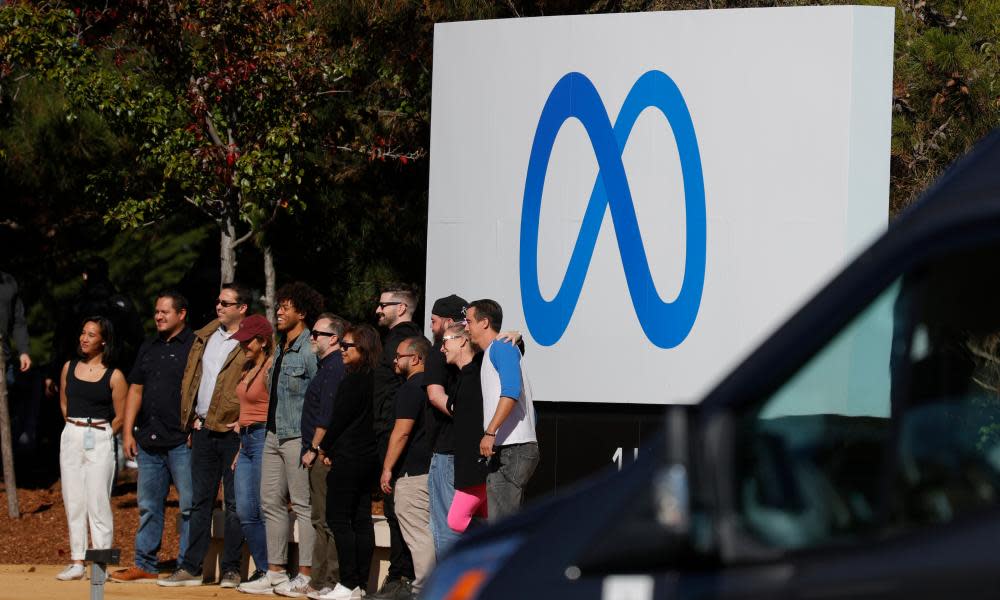Enter the metaverse: the digital future Mark Zuckerberg is steering us toward

Facebook CEO Mark Zuckerberg on Thursday outlined his vision for the future of the social media giant, formalising the company’s focus on the metaverse.
In a presentation at the company’s annual Connect conference, Zuckerberg announced the company is rebranding as Meta and detailed how his company aims to build a new version of the internet.
“We believe the metaverse will be the successor to the mobile internet, we’ll be able to feel present – like we’re right there with people no matter how far apart we actually are,” he said.
Related: Is Facebook leading us on a journey to the metaverse?
Here’s what you need to know:
What is the metaverse?
The metaverse is where the physical and digital worlds come together. It is a space where digital representations of people – avatars – interact at work and play, meeting in their office, going to concerts and even trying on clothes.
At the centre of this universe will be virtual reality, a digital world that you can already enter via Facebook’s Oculus VR headsets. It will also include augmented reality, a sort of step back from VR where elements of the digital world are layered on top of reality – think Pokémon Go or Facebook’s recent smart glasses tie-up with Ray-Ban.
Facebook already has a professional version of the metaverse under way: Horizon Workrooms, an app that lets Oculus-sporting workers enter virtual offices and hold meetings.
Indeed, Nick Clegg, Facebook’s vice-president of global affairs, holds his Monday team meetings in the office metaverse, replete with virtual table and whiteboard. Speaking last month, Clegg said the metaverse would be a series of interlinked worlds, where a user moves seamlessly from Facebook’s world to Apple’s or Google’s, or a computer game publisher’s. This month Facebook said it was creating 10,000 new jobs in the European Union as part of growth plans that include building a metaverse.
Any recommended reading?
The term metaverse – a combination of the prefix meta (meaning “beyond”) and universe – was coined in Snow Crash, a novel by American science fiction writer Neal Stephenson. The spiel on the Amazon website says it was written “in the years 1988 through 1991 as the author listened to a great deal of loud, relentless, depressing music”.
The novel’s protagonist, Hiro, is a hacker and a pizza delivery driver for the mafia and the first explanation of this virtual world in the novel states: “So Hiro’s not here at all. He’s in a computer-generated universe that his computer is drawing into his goggle and pumping into his earphones. In the lingo, this imaginary place is known as the Metaverse. Hiro spends a lot of time in the Metaverse.” And if Facebook gets its way, so will you.
Michael Abrash, chief scientist at Facebook’s Oculus business and a key figure in its VR efforts, said in a blogpost: “It all started with Snow Crash.”
What are the legal concerns about the metaverse?
The overwhelming concerns, particularly in the context of the Frances Haugen revelations and the widespread targeting of social media by state-backed hackers, are privacy and security.
For instance, an advertiser targeting you in a virtual world might not just be reacting to old-world data like your age and gender: what about your body language, your physiological responses, knowing who you are interacting with and how?
Facebook has already announced a $50m (£36m) investment programme to ensure the metaverse is built responsibly”, with the money distributed among organisations and academic institutions such as Seoul National University and Women in Immersive Tech.
How much is Facebook spending on the metaverse?
Billions of dollars a year already. The company said this week that investment in its Facebook Reality Labs division – where the company works on VR and AR – would reduce operating profit by $10bn (£7.25bn) in 2021.
It is a significant sum, but Facebook generates huge amounts of money from its core business of harvesting users’ data and then charging advertisers to access those people with targeted ads (focusing on things such as gender, location, income, relationship). Across Instagram, WhatsApp, Messenger and, of course, its eponymous platform, Facebook generated a net income – a US measure of profit – of $29bn last year from its 2.8 billion daily users. It can afford $10bn.
Will Facebook succeed?
Right now, it is hard to imagine Facebook being able to launch any product breezily. The Haugen revelations and testimonies have enhanced its status as a target of politicians, regulators and campaign groups on both sides of the Atlantic.
Facebook has been portrayed emphatically, through its own research, as a company that struggles – willingly or not – to contain the damaging impact of its products on its own users. Indeed, last month Facebook paused development of one product – Instagram Kids – due to the furore caused by the Haugen leaks.
Clegg has said the metaverse will take 10 years to build. Will it have assuaged the concerns of the public, watchdogs and governments about the company and its leadership by then?

 Yahoo Movies
Yahoo Movies 
